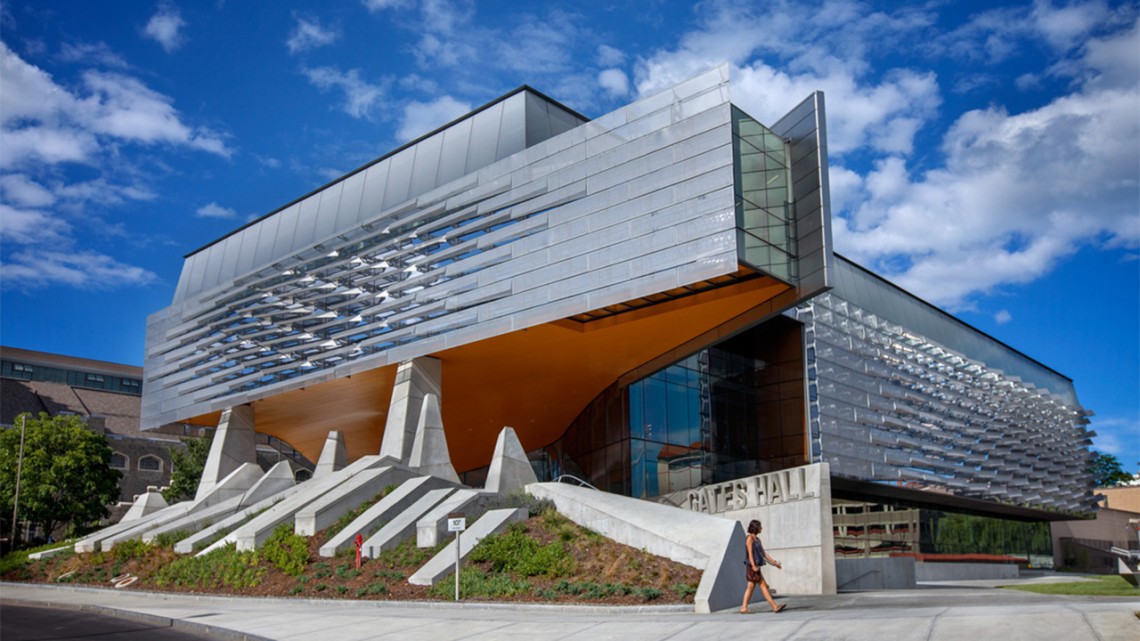
Gates Hall.
Cornell CIS to celebrate 20 years of impact Oct. 2-3
By Melanie Lefkowitz
In 1999, Y2K threatened to wreak havoc on global computer systems, the BlackBerry was released and “The Matrix” suggested we could all be living in an online simulation.
That same year, Cornell administrators – recognizing computing’s impact on society and scholarship – created the Faculty of Computing and Information Science (CIS), a universitywide academic unit enabling the broadest possible range of cross-disciplinary collaborations.
Two decades later, CIS researchers and alumni are recognized as leaders in their fields, developing technology in critical areas and shaping the information age. CIS built a new home in the 100,000-square-foot, state-of-the-art Bill & Melinda Gates Hall, and helped create Cornell Tech, the innovative campus on Roosevelt Island in Manhattan.
The number of undergraduates majoring in computer science, information science and statistics has multiplied sixfold, and CIS faculty now teach 1 in 10 Cornell students on the Ithaca campus.
To celebrate these achievements, CIS will host “Inspire • Innovate • Impact: Computing and Information Science @ 20,” an academic symposium Oct. 2-3 that will explore the role of technology in humanity and the history and future of computing at Cornell and around the world.
“The celebration will be a fun and intellectually stimulating event that will commemorate how CIS has become a model and leader in integrating computing into every university discipline, as well as a look forward to how CIS is shaping higher education and technology for the next 20 years,” said Jon Kleinberg, interim dean of CIS and the Tisch University Professor of Computer Science.
The events – which will take place in the Stater Ballroom – are free and open to the public, though registration is required.
Among the events is a fireside chat about the creation of CIS, moderated by President Martha E. Pollack, Oct. 2 from 5:30-6:45 p.m. Members of the panel are: Robert Constable, professor of computer science and founding CIS dean; President Emeritus Hunter R. Rawlings III; Dan Huttenlocher, dean of the Massachusetts Institute of Technology Schwarzman College of Computing and former dean of Cornell Tech and CIS; Greg Morrisett, the Jack and Rilla Neafsey Dean and Vice Provost of Cornell Tech and former dean of CIS; and Claire Cardie, professor in CIS and founding chair of the information science department.
The Oct. 2 event will also include the viewing of an anniversary video and a domino fall created by Christopher Wright ’20, an engineering student whose domino creations have been featured on “The Tonight Show.” It will be followed by a reception in the Statler Park Atrium featuring CIS-affiliated student clubs and doctoral students presenting research posters.
Panels on Oct. 3 will include a conversation with Cornell’s recipients of the MacArthur Fellowship – also known as the “genius grant” – moderated by Huttenlocher and presentations on research by CIS faculty. Nate Foster, associate professor in CIS, and Steven Jackson, chair and associate professor of information science, will moderate a panel of CIS alumni working in tech and academia.
At 2:45 p.m., higher education technology leaders, including Pollack, will discuss the changing role of computing, information and data science in society and education in a panel moderated by New York Times opinion writer Farhad Manjoo ’00.
The fireside chat and the higher education leadership panel will be livestreamed here.
In conjunction with the symposium, the exhibit “Digital Technology in Art: Celebrating 20 Years of CIS at Cornell” will be on display Oct. 1-13 at the Herbert F. Johnson Museum of Art. The Department of Computer Science also will hold a colloquium series lecture Oct. 3 at 4:30 p.m. in Gates G01 with Barbara Grosz ’69, the Higgins Professor of Natural Sciences at Harvard University and former dean of Harvard’s Radcliffe Institute for Advanced Study.
Media Contact
Get Cornell news delivered right to your inbox.
Subscribe

